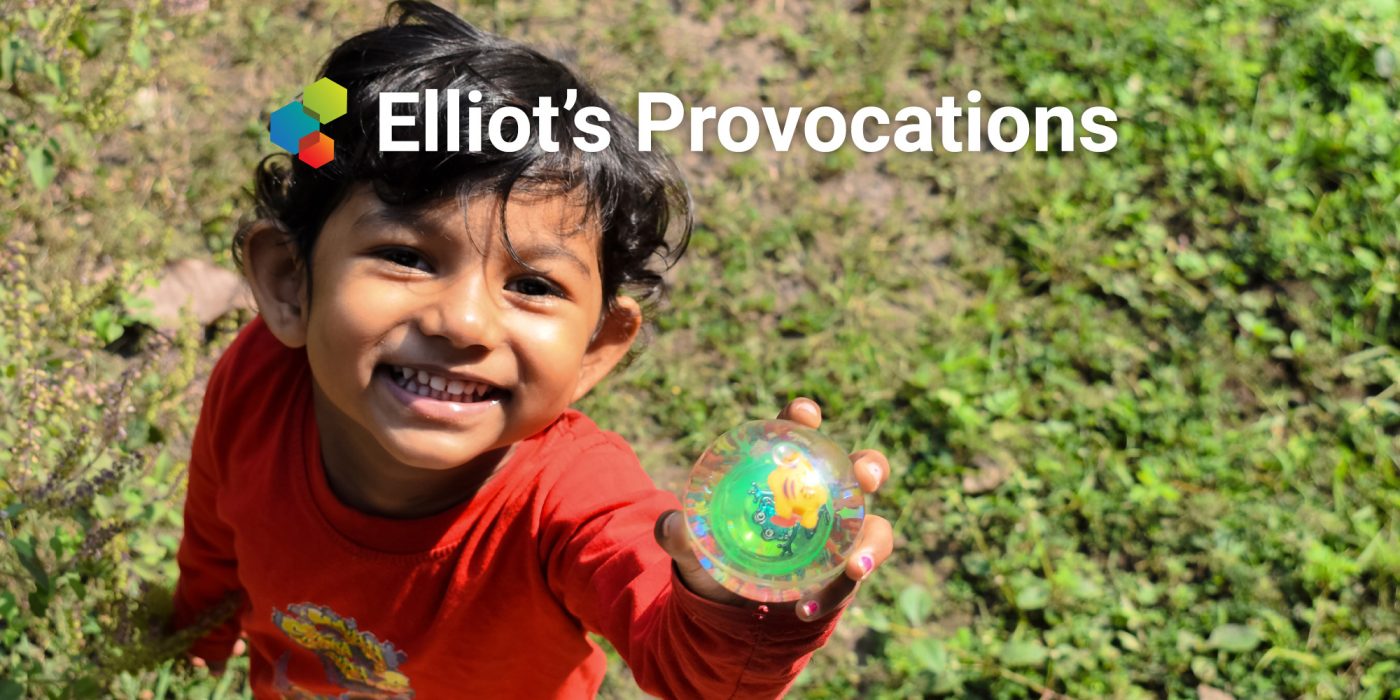Elliot’s Provocations unpacks current events in the early learning world and explores how we can chart a path to a future where all children can flourish. Regarding the title, if you’re not steeped in early childhood education (ECE) lingo, a “provocation” is the field’s term—taken from the Reggio-Emilia philosophy of early education—for offering someone the opportunity to engage with an idea.
We hope this monthly column does that: provocations are certainly not answers, but we hope Elliot’s Provocations helps you pause and consider concepts in a different way. This month’s column is split into two parts; read Part 1 here.
Utilitarian Goals
Think of the elected leaders’ language that I have quoted throughout this essay: inevitably, the argument comes back to jobs. I have made this argument many, many times myself. It’s compelling, and I don’t deny the political utility. As the U.S. Chamber of Commerce put it in 2017, high-quality early care and education supports the Workforce of Today, Workforce of Tomorrow. If you’re a lawmaker, you don’t have to particularly care about young kids to get behind that. Thus, if the question is ‘school readiness… for what?’ the answer most commonly is ‘for a decent job’ with the implied addendum ‘…and so kids don’t become a burden on society.’ In essence, the underlying argument posits that school readiness provides equality of opportunity.
While having a decent job is of course one key component of a flourishing adult life, placing employment and economic productivity as the Grail impoverishes the conversation in two ways. First, it loses the special nature of early childhood; second, it misses an opportunity to ground the conversation in the good life and the common good.
Early childhood is a unique period; with a base of love and support, young children’s exploration of their universe provides unparalleled levels of discovery and growth and joy. They truly are, in more ways than one, what psychologist Selma Fraiberg famously termed “the magic years.” The more we focus on contemporary ideas of school readiness — what we can now see as mainly a raw utilitarian ideal — the less we focus on maximizing the early years themselves. As Billy Powers, a former preschool teacher and now PhD student at Columbia Teacher’s College, puts it:
“An unintended consequence of positioning early childhood in terms of negative benefits is that it centers nearly everything but early childhood itself when making the case for it. Through this prism, early childhood education and care is no longer solely focused on fostering early childhood development, but instead a tool to prevent crime, drug use and dropping out of high school. Additionally, early childhood scholars have recently voiced concern that implicit in this framing is the view that the need for early childhood education and care is contingent on the continued existence of such ‘gaps, risks and deficits.’
Viewing early childhood through this frame will inevitably be reflected in the systems we construct. This, along with the enduring influence of intersectional discrimination, helps to explain how providing a living wage to child care staff is still a topic of discussion … If we were a society that truly prioritized young children, their parents and their caregivers, what would that system look like? We must follow their lead and construct a system of education and care that reflects the same sense of respect and urgency for the early years as the rest of the life course. Early childhood can speak for itself.”
Along the same lines, equality of opportunity is a remarkably limited frame. Sandel, again, has something to teach us:
“Inspired by the heroic rise of a few, we ask how others might also be enabled to escape the conditions that weigh them down. Rather than repair the conditions that people want to flee, we construct a politics that makes mobility the answer to inequality.
Breaking down barriers is a good thing. No one should be held back by poverty or prejudice. But a good society cannot be premised only on the promise of escape.
Focusing only, or mainly, on rising does little to cultivate the social bonds and civic attachments that democracy requires. Even a society more successful than ours at providing upward mobility would need to find ways to enable those who do not rise to flourish in place, and to see themselves as members of a common project. Our failure to do so makes life hard for those who lack meritocratic credentials and makes them doubt that they belong.
It is often assumed that the only alternative to equality of opportunity is a sterile, oppressive equality of results. But there is another alternative: a broad equality of condition that enables those who do not achieve great wealth or prestigious positions to live lives of decency and dignity – developing and exercising their abilities in work that wins social esteem, sharing in a widely diffused culture of learning, and deliberating with their fellow citizens about public affairs.”
One thing I like about observing young children—part of the magic years—is their inherent conceptual grasp of equality of condition. Three-year-olds don’t particularly care who is the fastest. My oldest daughter (now 7) was a very early reader, while my youngest (now 5) is still working at it. Instead of one lording it over the other, they quickly made a game of their differences: my youngest would tell my oldest what sign or book to read, and together they would develop shared adventures.
All of this to say: the aspirations of early childhood education must go beyond mere job preparation.
Where To?
The early care & education sector does not have to make the same mistakes as our K-12 and higher education brethren. The infection has not yet set in too deeply to be excised. I offer five suggestions.
1. The first step is, as I suggested earlier, recalibrating the very idea of school readiness. No “kindergarten readiness assessment” should be undertaken without, in the same report, noting indicators about family, school, service (child care and health care) and community readiness. Improving the ecosystem surrounding children should be seen as improving school readiness not merely as a matter of rhetoric, but as a matter of policy.
Moreover, quality rating systems—which have come under heavy criticism recently for failing to take into account a comprehensive view of quality, and which often have weak correlations to child outcomes—should be designed to bolster child care programs not only in serving their young charges well, but as key elements of the social fabric of neighborhoods and communities. These programs, many of which have served their areas for decades, can be vital arteries for supporting parents and bringing together community members; they are a highly underutilized asset in an era of increasing social dissolution.
2. Secondly, the early care & education sector should tie itself much more closely to other family support issues. Whether framed as child care or pre-K, early care can often (not always!) skate above more controversial policy areas like paid family leave or child tax credits. School readiness is something of a political skeleton key; education and workforce development are generally bipartisan concerns. The cost of using this key, however, is accepting meritocratic ideas that ultimately silo the sector and damage the goals of child and family flourishing. The sector should also forge stronger alliances with advocates in what have previously felt like far-flung topics, particularly around housing and climate change, issues which deeply color the child development ecosystem.
3. Thirdly, the early childhood field should explicitly reject the use of language or measures that promote meritocratic “winners” vs. ”losers” mentalities, or which encroach on the inherent dignity of all children regardless of their developmental trajectories. There have been admirable moves in this direction recently. For instance, in 2020 the National Association for the Education of Young Children put out a new statement on what’s known as ‘developmentally appropriate practice,’ which began:
“Each and every child, birth through age 8, has the right to equitable learning opportunities—in centers, family child care homes or schools—that fully support their optimal development and learning across all domains and content areas. Children are born eager to learn; they take delight exploring their world and making connections. The degree to which early learning programs support children’s delight and wonder in learning reflects the quality of that setting.”
This is a notable advance from the 2009 version of the position statement, whose first section was on “Reducing learning gaps and increasing the achievement of all children.” Such reflection and evolution should be applauded, and similar steps taken field wide.
4. Fourth, the early childhood sector should unwind efforts to enforce faux-meritocratic credentialism within the field – an approach sure to seep into the work itself. The early 2010s featured long and contentious debates about whether early childhood educators require bachelor’s degrees, culminating despite mixed evidence in a 2015 recommendation that lead teachers gain a baccalaureate.
Washington, D.C. has implemented such a requirement, although the timeline has been continually delayed. Many jurisdictions that are considering “pay parity” between early childhood educators and elementary school teachers similarly rely on an equivalency of credential (although progress has again been made with inserting experience as a substitute for education level). While training is certainly important, the value of early educators’ work—as reflected most literally in compensation—should not be tied to a degree. Just because the K-12 system has long since acceded to a questionable credentialism does not mean early childhood must follow suit. Particularly since the pandemic fired an asteroid into the early childhood workforce, now is the time to reconsider both the practical and philosophical implications behind those recommendations.
5. Fifth, advocates and policymakers should start making a case for a healthy, thriving early childhood on its own terms. These years are children’s first opportunity to begin making meaning of the world around them – and if you don’t think they’re paying attention, you haven’t seen near enough young kids. They are also formative years for parents. The transition to parenthood is a well-established crucible, one of the few life shocks that causes people to reconsider their identities and stances. If we plunge parents into a competitive Mad Max wasteland of early care options, that sends a message to them how they need to show up in order to create stability for their families.
What, in the end, do we want young children (and young parents) to be ready for? For a nation that forces you to run a race before your legs can even hold your own weight, or a nation that says ‘we’ve got you, take your time’? For a nation that is always looking to the next step, or a nation that takes life in its seasons, allowing space to cultivate deep relationships and pass our stories and values from one generation to the next? For a nation that only honors a person’s worth as their economic productivity, or a nation that honors everyone’s inherent humanity? For a nation that claims the individual should rise or fall by their own effort—never minding that the risers have almost always won some combination of the wealth lottery, genetic lottery and luck lottery—or a nation that accepts we all owe each other something, that for our hard work to reliably translate into results, we need to be surrounded from the beginning by supportive family and supportive community? What lessons do we want them to learn?
School readiness, indeed.
Read part 1 of this column here.




